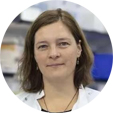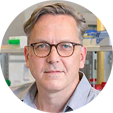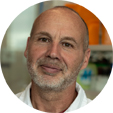Keynote speakers
|

Marcin Drąg
Wroclaw University of Science and Technology, PL
|
Marcin Drąg in 2003 earned his Ph.D. in organic and bioorganic chemistry working on new inhibitors of metallo- ad cysteine proteases. His Ph.D. thesis was awarded the best thesis in organic chemistry by Polish Chemical Society and Sigma-Aldrich (2004). Between 2005-2008 he conducted postdoctoral research at The Burnham Institute for Medical Research in La Jolla, CA (USA) in prof. Guy Salvesen laboratory. After coming back to Poland, in 2011 he received Doctor of Sciences Degree in chemistry (habilitation) for work on new types of combinatorial libraries to investigate proteolytic enzymes. In 2016 he received Professor title in chemistry from President of Poland. From January 2020 prof. Drąg is Head of Department of Chemical Biology and Bioimaging at WUST. His research interests in chemical biology include the design and synthesis of substrates, inhibitors and activity-based probes to decipher the mechanism of action and the function of proteases in health and disease. In particular, his laboratory has developed specialization in the application of a large number of unnatural amino acids in combinatorial library structures and the procedure called HyCoSuL (hybrid combinatorial substrate library) that combines natural (proteinogenic) and unnatural (non-proteinogenic) amino acids. |
|

Galia Blum
The Hebrew University of Jerusalem, IL
|
Prof. Galia Blum started her academic studies with a bachelor's in Chemistry at the Hebrew University. Then she shifted to Biochemistry and completed her Ph.D. in Cancer Research in the lab of Alex Levitzki, developing inhibitors of the IGF-1R tyrosine kinase at the Institute of Life Sciences of the Hebrew University. She moved on to Stanford University, where she then completed a postdoctoral fellowship focusing on developing imaging reagents for proteases in the lab of Professor Matthew Bogyo.
The research in the Blum laboratory at the Institute for Drug Research at the Hebrew University, Faculty of Medicine, is interdisciplinary, with the unique ability to combine organic chemistry methods with biochemical methodologies. The Blum Research Laboratory is focused on developing novel probes to detect and image protease activity and applying them to investigate the involvement of proteases in normal and pathological conditions. Currently, the diseases that are of interest in the Blum lab are mainly cancer, to which the newly developed probes are applied as molecular imaging reagents. In the last few years, probes that enable theranostic applications (combining therapy and diagnostic in one) have been developed and applied to animal models of cancer and atherosclerosis. Her research has led to the development of protease gold nanoparticles with extraordinary potential to aid in cancer medical use. Recently, her research discovered a connection between response to immunotherapy and protease activity in melanoma which she is now investigating in a lung cancer setting. The unique expertise in chemistry, biochemistry, optical, and CT imaging makes Prof. Blum a world leader in protease imaging, and her research has translational potential.
|
|

Monique Mulder
Leiden University Medical Centre, NL
|
Monique Mulder earned her PhD in Medicinal Chemistry at Utrecht University in 2012. Armed with a strong foundation in chemistry, she embarked on a trajectory that melds chemical principles with cutting-edge biological techniques. Leading the Mulder lab at Leiden University Medical Center, her current research revolves around uncovering the intricate mechanisms governing post-translational modifications of substrate proteins by ubiquitin and ubiquitin-like proteins. The lab specializes in crafting tailored molecular tools and probes essential for unraveling the complexities of protein (de)ubiquitination. Her focus extends to understanding how dysregulation in these processes contributes to the pathogenesis of diseases like Huntington’s disease, a dominantly inherited neurodegenerative disorder, and cancer, elucidating the pathogenesis at a molecular level.
Recent endeavors in the Mulder lab involve pioneering platform technologies —such as assays, reagents, and probes— aimed at decoding the biological intricacies and mechanisms of action behind E3 ligases. These ligases, pivotal in cellular regulation, have gained significant attention due to their role in targeted protein degradation, presenting promising avenues for therapeutic intervention. A key aspect of the lab's research involves discovering novel ligands for disease-specific E3 ligases, a pursuit that holds immense potential for pioneering diagnostic approaches and therapeutic strategies. The lab's emphasis on identifying ligases demonstrating disease-specific expression or cell- and tissue-specific localization aligns perfectly with their goal of unraveling crucial knowledge essential for intervening in diseases.
|
|

Esther Sammler
University of Dundee, UK
|
Esther Sammler is a Consultant Neurologist at the University of Dundee based in the MRC Protein Phosphorylation and Ubiquitylation Unit. Her lab is interested in deciphering dysregulated LRRK2 and lysosomal signalling in Parkinson’s disease and the functional impact of genetic variation in humans for annotating pathogenicity. As a practicing clinician, she sees patients with movement and neurogenetic disorders. Esther is invested in public and patient involvement and runs clinical trials in Parkinson's disease as principal and chief investigator. Esther obtained her medical degree from the Ludwig Maximilian University of Munich (2003) and trained in neurology at the University of Heidelberg, Germany before moving to Scotland to complete the Scottish Neurology Training programme. She completed her PhD as a Wellcome Trust Clinical PhD fellow on “The signalling pathway of the E3 ligase subunit FBXO7 and its role in hereditary Parkinsonism” under the supervision of Professor Dario Alessi FRS in 2014. She is funded by The Michael J Fox Foundation, MRC UKRI, and a Senior Clinical Fellowship by the Chief Scientist Office in Scotland. |
|

Hemmo Meyer
University of Duisburg-Essen, DE
|
Hemmo Meyer earned his PhD in 1997 in Marburg, Germany, working on intracellular cytomegalovirus maturation. He did postdocs at the ICRF in London UK and at Yale Medical School, New Haven US, where he started working on stress response pathways governed by ubiquitin and the protein unfoldase VCP/p97, before he became group leader in 2003 at ETH Zurich, Switzerland. Since 2009, he holds the chair of Molecular Biology at the University of Duisburg-Essen, Germany, where he also leads a collaborative research center. Meyer discovered p97's major ubiquitin-specific client adapter, Ufd1-Npl4, and established that diverse functions of p97 are governed by alternative adapters. His lab identified and characterized various cellular ubiquitin-dependent functions of p97 such as cell cycle signaling and DNA repair pathways. In parallel, he linked p97 to endosomal transport and lysosomal damage response pathways and connected defects in these functions to the pathogenesis of p97-associated multisystem proteinopathy-1. More recently, the Meyer lab uncovered a p97-governed activation pathway of protein phosphatase-1, whose targeting to p97 is ubiquitin-independent and mediated by the adapter p37, thus illustrating the functional diversity and the significance of the p97 system. |
|

Nico Dantuma
Karolinska Institute, SE
|
Nico Dantuma obtained his PhD at the Utrecht University. Since 2011 he is a Professor of Molecular Cell Biology at the Karolinska Institute. He has a long-standing interest in the role of the ubiquitin system, which is critically involved in maintenance of protein homeostasis by tightly regulating intracellular protein degradation. It is therefore not surprising that this journey brought him into the realm of immunology, cancer and neurodegenerative disorders. The Dantuma lab has developed cellular and transgenic mouse models for functional analysis of ubiquitin-dependent protein degradation using fluorescent based reporter substrates. These models have been widely used in the field for studying the functionality of this proteolytic pathway in physiological and pathological conditions. With these reporter systems, his group has studied the functionality of ubiquitin-dependent degradation in various neurodegenerative diseases as well as the potential of the ubiquitin system as drug target in cancer therapy. His studies on neurodegenerative diseases have indicated that the functional status of ubiquitin-dependent proteasomal degradation is relatively well preserved in these conditions, which has opened the possibility to therapeutically exploit this system. More recently, he has initiated academic drug discovery projects aimed at the development of novel small drug-like compounds that modulate ubiquitin-dependent protein degradation with as long-term aim to therapeutically target this system in cancer and neurodegenerative diseases. |
|
Paul Thompson
Mission Therapeutics, UK
|
|
|

Patrick Vourc`h
Université de Tours, FR
|
Patrick Vourc'h is Professor of Biochemistry and Molecular Biology, and Head of the Motor Neuron Disease Reference Laboratory at Tours Hospital (CHU), France. He is co-leader of the team Genetics and Pathophysiology of Neurodevelopmental and Motor Neuronal Disorders in the research unit iBRAIN, Université de Tours, INSERM. After a PhD on the genetics of autism, he completed a post-doctoral fellowship at the Reed Neurological Center, UCLA, Los Angeles (USA), where he worked on a cell therapy approach to Parkinson's disease. For several years now, he has been particularly interested in amyotrophic lateral sclerosis (Charcot disease), and in understanding the underlying pathophysiological mechanisms by studying post-translational modifications such as SUMOylation and ubiquitination of proteins encoded by causative genes in this neurodegenerative disease.
|
|

Michele Vendruscolo
University of Cambridge, UK
|
Michele Vendruscolo is Professor of Biophysics, Director of the Chemistry of Health Laboratory and Co-Director of the Centre for Misfolding Diseases at the Department of Chemistry of the University of Cambridge, where he moved over 20 years ago. His work is aimed at establishing the fundamental principles of protein homeostasis and protein aggregation, and at exploiting these principles to develop methods for drug discovery in neurodegenerative diseases. He has published over 500 scientific papers and 20 patents and given over 500 invited lectures at international meetings. |
|

Alfred Vertegaal
Leiden University, NL
|
Alfred Vertegaal obtained his PhD in 2001 in Leiden, the Netherlands, studying viral oncogenic transformation. He did his postdoc at the Wellcome Trust Biocentre in Dundee, UK where he started working on Small Ubiquitin-like Modifiers (SUMO). In 2004 he started his lab at the Leiden University Medical Center on SUMO signaling and uncovered large dynamic SUMO and ubiquitin target protein networks using proteomics approaches. His lab contributes to our understanding of the key roles of SUMOylation in cell cycle progression and genome stability. When the first clinical grade SUMO E1 inhibitors became available, his lab started exploiting these inhibitors in cancer models. |
|


